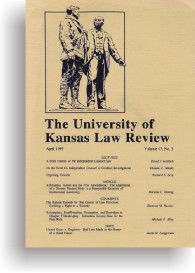Slouching Toward Universal Coverage
 Facing potential loss of $458 million in federal Medicaid matching dollars, Speaker Salvatore DiMasi and other Massachusetts legislators knew something had to be done on state health policy. But DiMasi's initial idea for health policy reform was no more ambitious than that. Yet the legislation that Governor Romney eventually signed on April 12, 2006, was an ambitious, ground-breaking package of reforms aspiring to bring near-universal coverage to the state, including 500,000 previously uninsured residents.
Facing potential loss of $458 million in federal Medicaid matching dollars, Speaker Salvatore DiMasi and other Massachusetts legislators knew something had to be done on state health policy. But DiMasi's initial idea for health policy reform was no more ambitious than that. Yet the legislation that Governor Romney eventually signed on April 12, 2006, was an ambitious, ground-breaking package of reforms aspiring to bring near-universal coverage to the state, including 500,000 previously uninsured residents.
Under a Republican Governor and declared 2008 presidential candidate, and a overwhelmingly democratic legislature with an active special interest lobby, a single-payor, government-sponsored approach to universal coverage would have been a political non-starter. Instead, the Massachusetts plan brings together a patchwork of reforms -- expanding existing state programs and insurance regulation, enhancing tax incentives and government subsidies, and adding new mandates and options for individuals and businesses. The program, set for January 2007 implementation, is mammoth in scope and aim. Recent reports estimate the first-year budget overrun around $150 million. Despite noble ambitions, many questions remain about the potential for this massive beast to survive the long, hard slog to universal health coverage.
On Friday, November 10, 2006, the Kansas Law Review held its annual symposium on "The Massachusetts Plan and the Future of Universal Coverage." We were honored to have Speaker DiMasi's chief health counsel, Christie Hager, open the program with a description of the new law and the political climate that facilitated its passage. A day-long program of experts offering a range of perspectives, critiques, implementation challenges, and alternative proposals followed:
 Christie Hager, J.D., M.P.H., Chief Health Counsel, Office of Speaker Salvatore F. DiMasi, Massachusetts House of Representatives and Adjunct Professor, Suffolk University Law School, Health Reform in Massachusetts: A Social Compact and a Bold Experiment
Christie Hager, J.D., M.P.H., Chief Health Counsel, Office of Speaker Salvatore F. DiMasi, Massachusetts House of Representatives and Adjunct Professor, Suffolk University Law School, Health Reform in Massachusetts: A Social Compact and a Bold Experiment Sidney D. Watson, J.D., Professor, Saint Louis University School of Law, The Road from Massachusetts to Missouri: What Would It Take for Other States to Replicate the Massachusetts Plan for Universal Coverage?
Marcia J. Nielsen, Ph.D., M.P.H., Interim Executive Director, Kansas Health Policy Authority, State of Kansas, Health Reform in Kansas: Context, Challenges, and Capacity
Timothy S. Jost, J.D., Robert L. Willett Family Professor of Law, Washington and Lee University, School of Law, Comprehensive Health Reform: The Role of Consumer Self-Insurance
David A. Hyman, J.D., M.D., Professor and Galowich-Huizenga Faculty Scholar, University of Illinois at Urbana-Champaign College of Law, Universal Coverage: Camelot or Brigadoon?
Michael H. Fox, Sc.D., Associate Professor, Health Policy & Management and Research & Training Center on Independent Living, University of Kansas, Health Reform: The Rhetoric and the Reality
Joan Krause, J.D., George Butler Research Professor of Law and Co-Director, Health Law & Policy Institute, University of Houston Law Center, Fraud in Universal Coverage: The Usual Suspects (and Then Some)
Peter D. Jacobson, J.D, M.P.H., Professor of Health Law & Policy, Department of Health Management & Policy, School of Public Health, University of Michigan, Let 1000 Flowers Wilt: The Futility of State-Level Health Care Reform
Amy B. Monahan, J.D., Associate Professor, University of Missouri – Columbia School of Law, The Latest Battleground in ERISA Preemption: Pay or Play Mandates and the Future of State-Based Universal Coverage
William M. Sage, J.D., M.D., Professor and James R. Dougherty Chair for Faculty Excellence, University of Texas at Austin School of Law, Can the Fact that 90 Percent of Americans Live Within 15 Miles of a Wal-Mart Help Achieve Universal Health Coverage?
Melissa B. Jacoby, J.D., Professor, University of North Carolina – Chapel Hill School of Law, Debtor-Creditor Perspectives on Universal Health Coverage
Jerry Menikoff, J.D., M.P.P., M.D., Assistant Professor of Law, Ethics & Medicine, Department of History & Philosophy of Medicine, School of Medicine, University of Kansas, Who Knows Where Universal Health Care Goes? The Hunt for the Omniscient Critic
Elizabeth A. Weeks, J.D., Associate Professor, University of Kansas School of Law, Gap-Filling, Risk-Pooling, and the “Connector”: Private Market Solutions to Universal Coverage
The consensus at the end of the day, while not apocalyptic, was notably pessimistic on the promise of the Massachusetts plan for acheiving universal coverage. As summarized by KU Dean Gail Agrawal: "Everyone who has their roots in public health sees health care coverage as one of the pressing social issues of our time," she said. "I don’t know that the Massachusetts model is going to be the answer. I’m just happy that the question is on the table again."
The Second Coming
W.B. Yeats
Turning and turning in the widening gyre
The falcon cannot hear the falconer;
Things fall apart; the centre cannot hold;
Mere anarchy is loosed upon the world,
The blood-dimmed tide is loosed, and everywhere
The ceremony of innocence is drowned;
The best lack all conviction, while the worst
Are full of passionate intensity.
Surely some revelation is at hand;
Surely the Second Coming is at hand.
The Second Coming! Hardly are those words out
When a vast image out of Spritus Mundi
Troubles my sight: somewhere in the sands of the desert.
A shape with lion body and the head of a man,
A gaze blank and pitiless as the sun,
Is moving its slow thighs, while all about it
Reel shadows of the indignant desert birds.
The darkness drops again; but now I know
That twenty centuries of stony sleep
were vexed to nightmare by a rocking cradle,
And what rough beast, its hour come round at last,
Slouches towards Bethlehem to be born?












0 Comments:
Post a Comment
<< Home